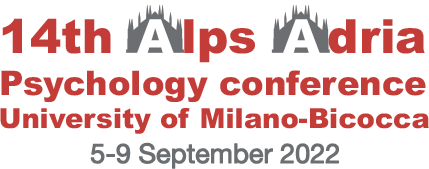

Tiziano Agostini
University of Trieste, Italy
Tiziano Agostini is Full Professor at the Department of Life Sciences of the University of Trieste. He teaches Introductory Psychology and Methods of Investigation and Intervention Applied to Sport and Health. For two years he carried out research in the United States where he also taught. He is interested in visual perception, methodology of psychological research, history of psychology, experimental psychology of sport, cognitive ergonomics, and emergency psychology. He coordinates national and international grants. He is the coordinator of the Ph.D. programme in Neuroscience and Cognitive Sciences. It counts more than 350 publications.

Auditory perception and modeling of movement: Twenty year of experimental research
Tiziano Agostini - University of Trieste, Italy - Mon. Sept. 5th 16:00
Since the publication of the 2004 paper entitled "The relevance of auditory information in optimizing hammer throwers performance", several scientific papers have been published to support the hypotheses put forward in the original article. From the results of these studies, we can reasonably state that: 1) Human body cyclical movements can be accurately represented by an auditory stimulus having specific rhythmical characteristics; 2) The auditory stimulus produced by a cyclic human movement is easily recognized by the subject who produced it; 3) Ecological sounds (the real sounds produced by real body movements) are more effective than artificial sounds in building up motor action mental representations; 4) Auditory information is an important feedback to exert an accurate control of timing in terms of improvement and standardization of a specific movement. All these evidences have important practical and theoretical implications.

Tiziano Agostini
University of Trieste, Italy
Tiziano Agostini is Full Professor at the Department of Life Sciences of the University of Trieste. He teaches Introductory Psychology and Methods of Investigation and Intervention Applied to Sport and Health. For two years he carried out research in the United States where he also taught. He is interested in visual perception, methodology of psychological research, history of psychology, experimental psychology of sport, cognitive ergonomics, and emergency psychology. He coordinates national and international grants. He is the coordinator of the Ph.D. programme in Neuroscience and Cognitive Sciences. It counts more than 350 publications.

Auditory perception and modeling of movement: Twenty year of experimental research
Tiziano Agostini - University of Trieste, Italy - Mon. Sept. 5th 16:00
Since the publication of the 2004 paper entitled "The relevance of auditory information in optimizing hammer throwers performance", several scientific papers have been published to support the hypotheses put forward in the original article. From the results of these studies, we can reasonably state that: 1) Human body cyclical movements can be accurately represented by an auditory stimulus having specific rhythmical characteristics; 2) The auditory stimulus produced by a cyclic human movement is easily recognized by the subject who produced it; 3) Ecological sounds (the real sounds produced by real body movements) are more effective than artificial sounds in building up motor action mental representations; 4) Auditory information is an important feedback to exert an accurate control of timing in terms of improvement and standardization of a specific movement. All these evidences have important practical and theoretical implications.

Urška Fekonja
University of Ljubljana, Slovenia
Urška Fekonja is an Associate Professor of Developmental Psychology, employed at the Department of Psychology, University of Ljubljana. My research interest focuses on the development and assessment of language and play in infants, toddlers and children; the development of emergent literacy and theory of mind, as well as the importance of the family environment and preschool for children's development and learning. I am the co-author of several tests and developmental scales for assessing early literacy and language development. I have published my research findings in numerous scientific monographs and papers as well as presented them at many international conferences.

Early language development: The interplay of child, family and sociocultural factors
Urška Fekonja - University of Ljubljana, Slovenia - Tue. Sept. 6th 10:30
Infancy, toddlerhood and early childhood are periods of rapid quantitative and qualitative developmental changes in language acquisition. It has been well established that child’s language develops within a sociocultural context, mainly in verbal and social interactions with more competent adults. Among most important factors contributing to early language development are family literacy and socioeconomic characteristics of home environment. In Slovenia, a large number of studies have been carried out in recent years investigating multiple pathways to early acquisition of various aspects of language, including vocabulary, grammar and storytelling ability. The results of these studies highlight the role of different factors of early language development, such as shared reading, parental knowledge of child development, characteristics of child-directed speech, child gender and dyadic symbolic play, as well as the dynamic relationships among them. The findings outline the importance of early detection of language delays and timely interventions, which focus on diminishing the risk and strengthening the protective factors, both within family and preschool settings.

Urška Fekonja
University of Ljubljana, Slovenia
Urška Fekonja is an Associate Professor of Developmental Psychology, employed at the Department of Psychology, University of Ljubljana. My research interest focuses on the development and assessment of language and play in infants, toddlers and children; the development of emergent literacy and theory of mind, as well as the importance of the family environment and preschool for children's development and learning. I am the co-author of several tests and developmental scales for assessing early literacy and language development. I have published my research findings in numerous scientific monographs and papers as well as presented them at many international conferences.

Early language development: The interplay of child, family and sociocultural factors
Urška Fekonja - University of Ljubljana, Slovenia - Tue. Sept. 6th 10:30
Infancy, toddlerhood and early childhood are periods of rapid quantitative and qualitative developmental changes in language acquisition. It has been well established that child’s language develops within a sociocultural context, mainly in verbal and social interactions with more competent adults. Among most important factors contributing to early language development are family literacy and socioeconomic characteristics of home environment. In Slovenia, a large number of studies have been carried out in recent years investigating multiple pathways to early acquisition of various aspects of language, including vocabulary, grammar and storytelling ability. The results of these studies highlight the role of different factors of early language development, such as shared reading, parental knowledge of child development, characteristics of child-directed speech, child gender and dyadic symbolic play, as well as the dynamic relationships among them. The findings outline the importance of early detection of language delays and timely interventions, which focus on diminishing the risk and strengthening the protective factors, both within family and preschool settings.

Mladenka Tkalčić
University of Rijeka, Croatia
Mladenka Tkalčić obtained her graduate degree in psychology at the University of Rijeka, Croatia (1986). She obtained her master of science degree in psychology at the University of Ljubljana, Slovenia (1990) and doctoral degree in psychology at the University of Zagreb, Croatia (1998). She is working as full professor at the Department of Psychology, Faculty of Humanities and Social Sciences at the University of Rijeka. She is currently the lead investigator of the scientific project “Cognitive-affective and behavioral aspects of irritable bowel syndrome” funded by the University of Rijeka, and a collaborator on the international scientific project “Computational psychosomatic medicine based on predictive coding: Basic study on irritable bowel syndrome” funded by the Japanese Society for the Promotion of Science. She has held several invited lectures in scientific symposia and participated in more than 50 international scientific conferences. She has published more than 40 scientific papers, a biopsychology textbook, several book chapters, and she is the editor of a scientific monography on irritable bowel syndrome. She has received several awards for her work in psychology. She is a member of the Croatian Psychological Association, Croatian Society for Neuroscience, European Association for Psychosomatic Medicine and Croatian Society for Gastroenterology.

Brain–gut miscommunication: irritable bowel syndrome
Mladenka Tkalčić - University of Rijeka, Croatia - Wed. Sept. 7th 10:00
It is well known that the brain and the gastrointestinal system are closely linked through bidirectional signalling pathways that include nerves, hormones, and inflammatory molecules, and that dysregulation of this brain-gut axis could lead to functional gastrointestinal (GI) disorders, such as irritable bowel syndrome (IBS). IBS is one of the most common functional GI disorders characterized by abdominal pain and stool irregularities. IBS is considered a biopsychosocial disorder and its symptoms could result from any combination of altered GI motility, visceral hypersensitivity, increased intestinal permeability, immune activation of the bowel mucosa, alteration in the microbiota, and disturbances in brain-gut function. The brain-gut axis (CNS, central nervous system – ENS, enteric nervous system) is the neuroanatomic substrate by which psychosocial factors influence the GI tract and vice versa. IBS symptoms are often maintained by a vicious cycle of physical, behavioural, and environmental factors that disrupt the neural connections between the brain and gut. Using the Biopsychosocial Conceptual Model of functional GI disorders, the goal of this lecture is to give an overview of our research results and to discuss them in the context of recent understanding on how the complex interactions of biological, psychological, and environmental factors contribute to the development and maintenance of IBS, with an emphasis on the brain-gut interaction. She is currently the lead investigator of the scientific project “Cognitive-affective and behavioral aspects of irritable bowel syndrome” funded by the University of Rijeka, and a collaborator on the international scientific project “Computational psychosomatic medicine based on predictive coding: Basic study on irritable bowel syndrome” funded by the Japanese Society for the Promotion of Science. She has held several invited lectures in scientific symposia and participated in more than 50 international scientific conferences. She has published more than 40 scientific papers, a biopsychology textbook, several book chapters, and she is the editor of a scientific monography on irritable bowel syndrome. She has received several awards for her work in psychology. She is a member of the Croatian Psychological Association, Croatian Society for Neuroscience, European Association for Psychosomatic Medicine and Croatian Society for Gastroenterology.

Mladenka Tkalčić
University of Rijeka, Croatia
Mladenka Tkalčić obtained her graduate degree in psychology at the University of Rijeka, Croatia (1986). She obtained her master of science degree in psychology at the University of Ljubljana, Slovenia (1990) and doctoral degree in psychology at the University of Zagreb, Croatia (1998). She is working as full professor at the Department of Psychology, Faculty of Humanities and Social Sciences at the University of Rijeka. She is currently the lead investigator of the scientific project “Cognitive-affective and behavioral aspects of irritable bowel syndrome” funded by the University of Rijeka, and a collaborator on the international scientific project “Computational psychosomatic medicine based on predictive coding: Basic study on irritable bowel syndrome” funded by the Japanese Society for the Promotion of Science. She has held several invited lectures in scientific symposia and participated in more than 50 international scientific conferences. She has published more than 40 scientific papers, a biopsychology textbook, several book chapters, and she is the editor of a scientific monography on irritable bowel syndrome. She has received several awards for her work in psychology. She is a member of the Croatian Psychological Association, Croatian Society for Neuroscience, European Association for Psychosomatic Medicine and Croatian Society for Gastroenterology.

Brain–gut miscommunication: irritable bowel syndrome
Mladenka Tkalčić - University of Rijeka, Croatia - Wed. Sept. 7th 10:00
It is well known that the brain and the gastrointestinal system are closely linked through bidirectional signalling pathways that include nerves, hormones, and inflammatory molecules, and that dysregulation of this brain-gut axis could lead to functional gastrointestinal (GI) disorders, such as irritable bowel syndrome (IBS). IBS is one of the most common functional GI disorders characterized by abdominal pain and stool irregularities. IBS is considered a biopsychosocial disorder and its symptoms could result from any combination of altered GI motility, visceral hypersensitivity, increased intestinal permeability, immune activation of the bowel mucosa, alteration in the microbiota, and disturbances in brain-gut function. The brain-gut axis (CNS, central nervous system – ENS, enteric nervous system) is the neuroanatomic substrate by which psychosocial factors influence the GI tract and vice versa. IBS symptoms are often maintained by a vicious cycle of physical, behavioural, and environmental factors that disrupt the neural connections between the brain and gut. Using the Biopsychosocial Conceptual Model of functional GI disorders, the goal of this lecture is to give an overview of our research results and to discuss them in the context of recent understanding on how the complex interactions of biological, psychological, and environmental factors contribute to the development and maintenance of IBS, with an emphasis on the brain-gut interaction. She is currently the lead investigator of the scientific project “Cognitive-affective and behavioral aspects of irritable bowel syndrome” funded by the University of Rijeka, and a collaborator on the international scientific project “Computational psychosomatic medicine based on predictive coding: Basic study on irritable bowel syndrome” funded by the Japanese Society for the Promotion of Science. She has held several invited lectures in scientific symposia and participated in more than 50 international scientific conferences. She has published more than 40 scientific papers, a biopsychology textbook, several book chapters, and she is the editor of a scientific monography on irritable bowel syndrome. She has received several awards for her work in psychology. She is a member of the Croatian Psychological Association, Croatian Society for Neuroscience, European Association for Psychosomatic Medicine and Croatian Society for Gastroenterology.

Ferenc Kocsor
University of Pécs, Hungary
Ferenc Kocsor is a research associate at the Institute of Psychology, University of Pécs, Hungary. He has a background in biology and economics. He obtained his PhD in behavioural sciences in 2015 at the Medical School, and made his habilitation in psychology in 2022. He is active in the fields of both cognitive and evolutionary psychology. The main focus of his research is face perception. In his current studies he tries to integrate knowledge from different fields using diverse experimental methods. As a lecturer, he is involved in both undergraduate and postgraduate programmes in psychology. As an organiser, he initiated the launch of the international doctoral programme in psychology at the University of Pécs.

Misled by affections: A glimpse into the processing of facial stimuli with eye-tracking and reaction time measurements
Ferenc Kocsor - University of Pécs, Hungary - Thu. Sept. 8th 15:00
Recognition accuracy of faces can be influenced by stimulating a specific part of the face-space. This effect might be ascribed either to the semantic information which play a role in recollection of memories, the affective information evoked by the presented stimuli, or both. The importance of spreading activation during recognition can be understood in light of several explanatory frameworks, some of which try to explain face recognition effects on different levels: models focusing on semantic networks, trait inference mapping, cognitive processes, and brain anatomy all successfully explain some features of recognition. In an experimental setting words or pictures can be used as priming stimuli, which can differ in their affective and semantic content. In our studies we intended to reveal the effect of congruency on recognition speed and eye movements, and tried to use the results to integrate previous models. Depending on the type of priming stimuli, length of presentation, and experimental design, affective and semantic incongruency decreased recognition speed and affected fixation times to a different extent. The results confirm the assumption that both spreading activation of associative networks and the affective state evoked by irrelevant stimuli influence face recognition processes, incongruency putting a cognitive load on recognition.

Ferenc Kocsor
University of Pécs, Hungary
Ferenc Kocsor is a research associate at the Institute of Psychology, University of Pécs, Hungary. He has a background in biology and economics. He obtained his PhD in behavioural sciences in 2015 at the Medical School, and made his habilitation in psychology in 2022. He is active in the fields of both cognitive and evolutionary psychology. The main focus of his research is face perception. In his current studies he tries to integrate knowledge from different fields using diverse experimental methods. As a lecturer, he is involved in both undergraduate and postgraduate programmes in psychology. As an organiser, he initiated the launch of the international doctoral programme in psychology at the University of Pécs.

Misled by affections: A glimpse into the processing of facial stimuli with eye-tracking and reaction time measurements
Ferenc Kocsor - University of Pécs, Hungary - Thu. Sept. 8th 15:00
Recognition accuracy of faces can be influenced by stimulating a specific part of the face-space. This effect might be ascribed either to the semantic information which play a role in recollection of memories, the affective information evoked by the presented stimuli, or both. The importance of spreading activation during recognition can be understood in light of several explanatory frameworks, some of which try to explain face recognition effects on different levels: models focusing on semantic networks, trait inference mapping, cognitive processes, and brain anatomy all successfully explain some features of recognition. In an experimental setting words or pictures can be used as priming stimuli, which can differ in their affective and semantic content. In our studies we intended to reveal the effect of congruency on recognition speed and eye movements, and tried to use the results to integrate previous models. Depending on the type of priming stimuli, length of presentation, and experimental design, affective and semantic incongruency decreased recognition speed and affected fixation times to a different extent. The results confirm the assumption that both spreading activation of associative networks and the affective state evoked by irrelevant stimuli influence face recognition processes, incongruency putting a cognitive load on recognition.

Herbert Janig
University of Klagenfurt, Austria
Dr. Herbert Janig, born 1948. Clinical and Health Psychologist. Professor at the University of Klagenfurt (retired 2013). Research focuses on health psychology, health care research, evaluation research. Head of section for Psychological Basic Research (1992-2002); Head of Institute for Psychology at the University of Klagenfurt 2000-2002, Dean of Faculty of School of Health and Care at the University of Applied Sciences Carinthia 2002-2008. Recently together with R. Likar and G. Pinter published book: Selbstheilung (self-healing).

Growing old, not worthless
Herbert Janig - University of Klagenfurt, Austria - Fri. Sept. 9th 10:00 (in remote)
Our ideas about growing old and being old are shaped by our family role models, economic, social, medical and other influences. Growing old will not happen in the way we imagine when we are young. We must also acknowledge that our scientific knowledge of old age may not match our personal experiences. Age is not a uniform phase of life, and inter- and intra-individual differences can be very large. Ageism and exceptional examples of old people show us the limits and opportunities of growing old. For our own growing old, the theory of gerotranscendence offers clues as to what makes life in old age valuable and worth living.

Herbert Janig
University of Klagenfurt, Austria
Dr. Herbert Janig, born 1948. Clinical and Health Psychologist. Professor at the University of Klagenfurt (retired 2013). Research focuses on health psychology, health care research, evaluation research. Head of section for Psychological Basic Research (1992-2002); Head of Institute for Psychology at the University of Klagenfurt 2000-2002, Dean of Faculty of School of Health and Care at the University of Applied Sciences Carinthia 2002-2008. Recently together with R. Likar and G. Pinter published book: Selbstheilung (self-healing).

Growing old, not worthless
Herbert Janig - University of Klagenfurt, Austria - Fri. Sept. 9th 10:00 (in remote)
Our ideas about growing old and being old are shaped by our family role models, economic, social, medical and other influences. Growing old will not happen in the way we imagine when we are young. We must also acknowledge that our scientific knowledge of old age may not match our personal experiences. Age is not a uniform phase of life, and inter- and intra-individual differences can be very large. Ageism and exceptional examples of old people show us the limits and opportunities of growing old. For our own growing old, the theory of gerotranscendence offers clues as to what makes life in old age valuable and worth living.
